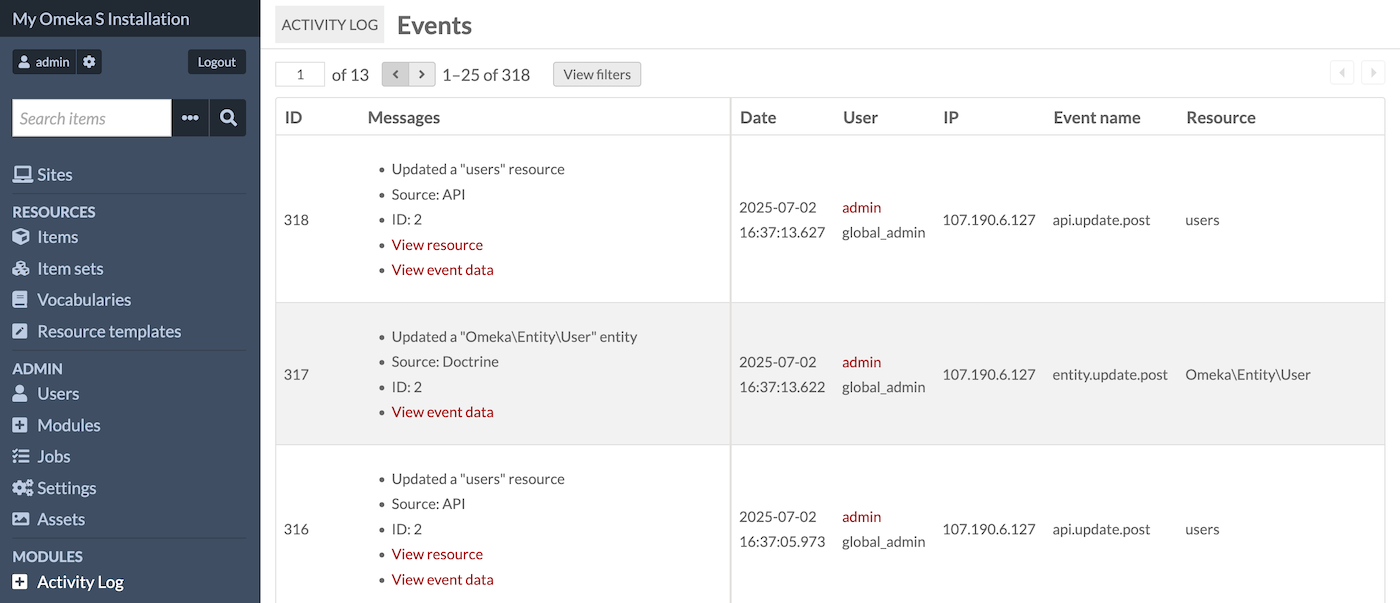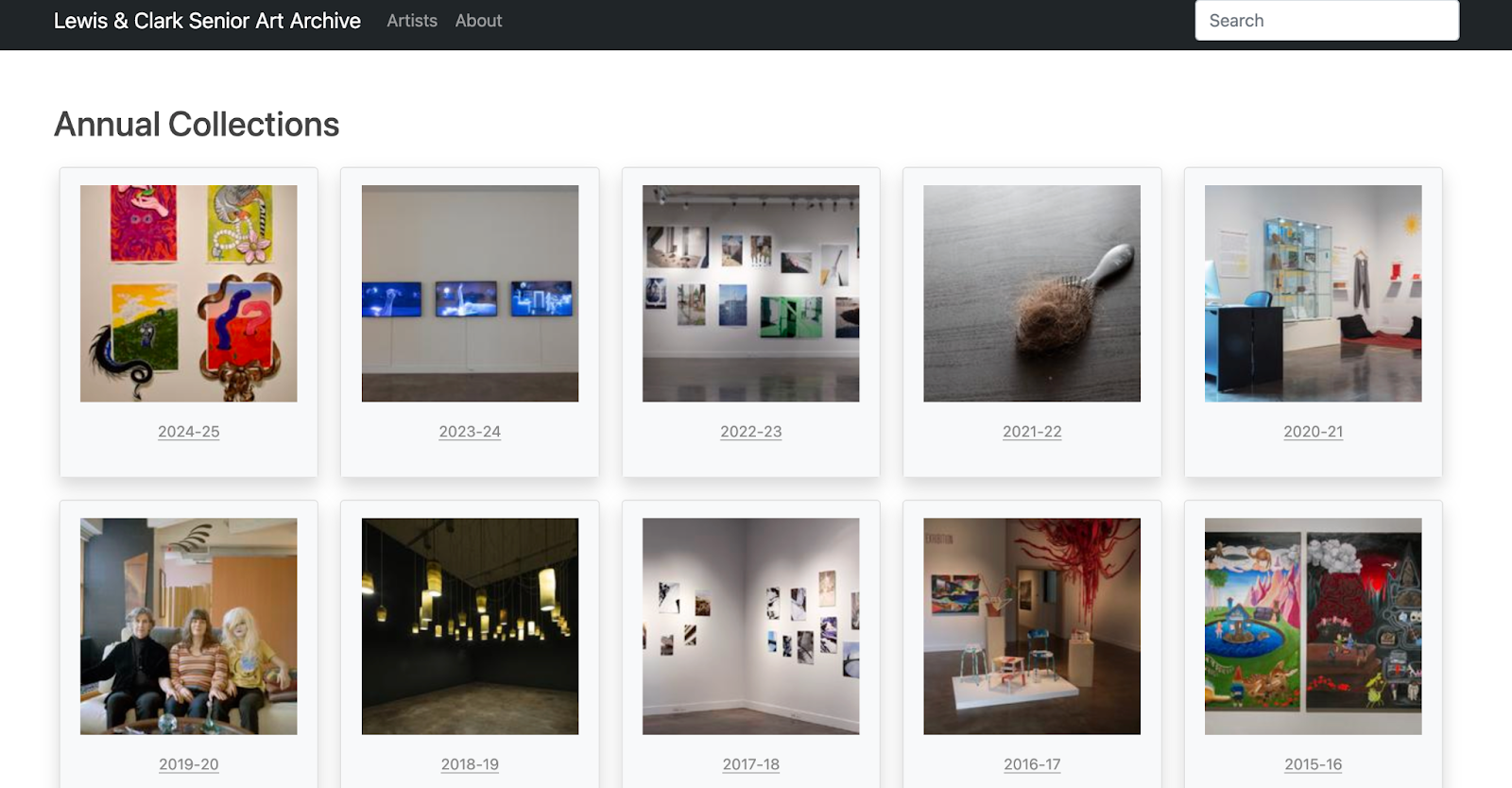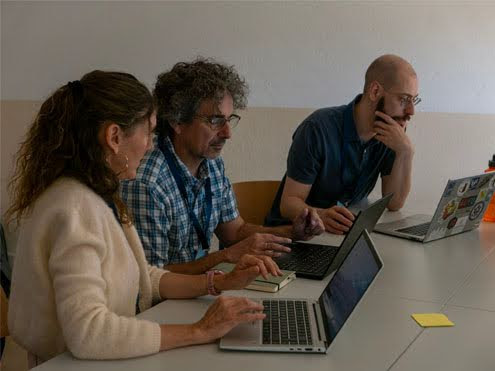Message from the Director
Dear Friends,
As we reach the close of July, the Omeka Team has been moving forward on all fronts. The Summer Intensives with Dani Wilcutt are finishing up their eight weeks of work (registration for the Fall courses is now open). The Development team is approaching new releases for the core of both Omeka Classic and Omeka S, and half a dozen new add-ons are rolling out for both platforms.
These developments are part of our effort to make sure that, even though Omeka Classic and Omeka S are well-established elements of the digital humanities and digital cultural heritage infrastructure, we continue to work hard to be responsive to your interests and needs as users. For us to do that, we need to hear from you about your work. What projects do you have underway? What kind of sites would you like to build? What functionality do your users need? Often we only hear the answers to these questions in face to face meetings. I was lucky to have some engagement of this sort during the DH2025 Omeka minicon. The valuable insights and aspirations that the participants brought to our day together will come right back into our development meetings as we plan for new features over the next year.
Of course, not every Omeka user can manage to come to an in-person event, so we’re brainstorming other ways to surface community voices. One current option is via our forums. We invite you to share your work and your plans in the “Community Contributions” section. Another option is to join us at the Omeka S Developer event in Luxembourg that is noted at the end of this newsletter. We’re on the look out for other approaches, so keep your eyes open on the socials for other opportunities to engage.
With my best wishes for a restorative summer, Sharon
New Developments
Recently, the Development Team released the Activity Log module. This module allows you to gather information about changes made in the Omeka interface into one table. Now, you can view all changes made to resources, sites, installation settings, users, and module-added data points.

Once you activate the module in the admin dashboard, Activity Log has no required settings. Activity Log will record events when it is active. The table will reflect all changes made in the installation by all users. It only lists events that modify; it does not include read-only events.
Users with permission to view the Activity Log can filter events. Users may filter the events using the multiple available filters, including ID, user, user role, IP, event name, resource, resource ID, from, and before.
See also… The OHMS Embed plugin for Omeka Classic is now available for download and use with your self-hosted Omeka Classic sites. Also, the OHMS Embed plugin is available for all subscription levels on Omeka.net.
Spotlight: Lewis & Clark Senior Art Archive

This quarter’s Omeka newsletter Spotlight is the Lewis & Clark Senior Art Archive! This Omeka Classic site highlights art works from almost five hundred undergraduate students at Lewis & Clark College. The art works are organized into collections for each academic year, dating from 1992 to the present. At the end of each academic year, the Hoffman Gallery of Contemporary Art hosts the Senior Art Exhibition, the culmination of artwork made by the graduating seniors in the art department at the end of their undergraduate journey at Lewis & Clark College. This site is developed and maintained by Watzek Library, and is a joint venture with the Art Department. Explore the collections and learn more about the project today.
Share your work with us for inclusion in our directories, and for a possible future Spotlight!
Meet the Team
Name: Jim Safley
Role: Senior Developer & Metadata Specialist
How long have you been with Omeka?
2007 (since the beginning)
What work have you done that our community would be familiar with?
Omeka S: Core code, Mapping, Value Suggest, Custom Vocab, File Sideload, Collecting, Numeric Data Types, Extract Text, Faceted Browse, Scripto, Zotero Import and many others. Omeka Classic: Collection Tree, Docs Viewer, Scripto, Item Relations, Simple Vocab, Derivative Images, Item Order, Zotero Import and many others.
Do you have a favorite project you’ve worked on or just a favorite part of working with the Omeka team/community? I enjoy working in open-source software with a team of witty, creative, and intelligent people. I enjoy building free tools for scholars, students, and cultural heritage institutions. I enjoy watching the Omeka community grow and find new ways to use and improve the software.
What’s a fun fact about you?
I had no plans to become a software developer. Over 20 years ago, after graduating with a history degree, I stumbled into a job opportunity with the future creators of Omeka that continues to be fruitful to this day.
Omeka in the World
The Omeka Team was thrilled to participate in DH2025 in Lisbon! We enjoyed getting to interact with our community through the pre-conference session, Doing DH with Omeka: a Mini-con for Omeka Users and Developers, on July 14th. Omeka users, designers, and developers have indicated an interest in growing the collaborative community.

Valérie Adriaens, Roberto Pareja, and Pierre Williame discuss data modeling issues at the DH2025 Omeka Users and Developers Mini-con.
This in-person mini-con was open to all DH2025 registrants for DH2025 and brought together novice and experienced users of the Omeka platforms, and designers and developers who work with the software to share their knowledge and experiences creating well-described, publicly accessible repositories of digitized cultural heritage materials and with mobilizing those materials to communicate sophisticated interpretation. During the day-long meeting, participants had the opportunity to discuss their work, make plans for future projects, develop community relationships, and learn from one another.
Thank you to all contributors and sponsors of DH2025–we look forward to seeing you all at future conferences!
Upcoming Event: International Omeka S Developer Gathering
The Luxembourg Centre for Contemporary and Digital History (C²DH), in collaboration with DARIAH-LU, is pleased to host an International Omeka S Developer Event from Wednesday, 3 September, to Friday, 5 September 2025, at the University of Luxembourg, Belval Campus.
Inspired by previous events, this year’s gathering will once again follow BarCamp principles, embracing an open, collaborative “unconference” format. There will be no keynote speeches or formal presentations, and no traditional workshops. Instead, the agenda will be co-created by you—the participants—ensuring that the sessions reflect the shared interests, challenges, and expertise of the community. Sessions will consist of breakout discussions, co-working groups, and hands-on problem-solving, all self-organized and participant-led. This format ensures an inclusive environment where all voices are heard and valued.
For more information and to register, visit: https://www.uni.lu/c2dh-en/events/international-omeka-s-developer-event/